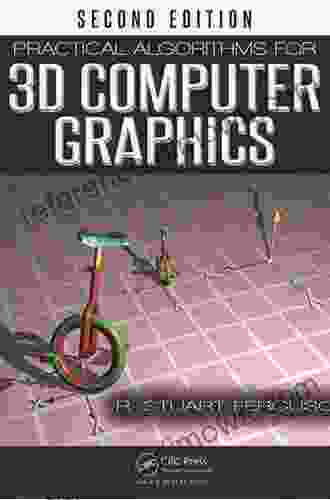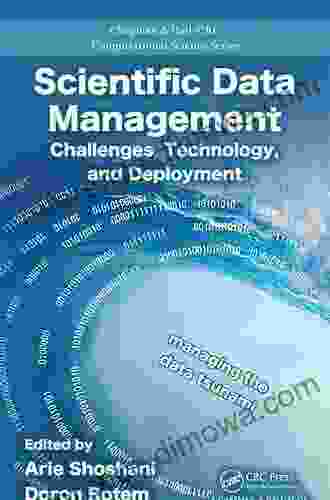Challenges, Technology and Deployment: A Comprehensive Guide to Computational Science

Computational science has emerged as a transformative field, revolutionizing scientific research and driving technological advancements across various disciplines. However, the rapid pace of innovation and the inherent complexities of computational systems pose significant challenges that require careful consideration and innovative solutions.
5 out of 5
| Language | : | English |
| File size | : | 18211 KB |
| Screen Reader | : | Supported |
| Print length | : | 590 pages |
| X-Ray for textbooks | : | Enabled |
This comprehensive guide delves into the multifaceted landscape of computational science, exploring the challenges, technologies, and deployment strategies that shape its present and future. Through in-depth analysis and expert insights, we provide readers with a thorough understanding of the key aspects involved in harnessing the full potential of computational science.
Challenges in Computational Science
The pursuit of computational science is not without its challenges. Researchers and practitioners encounter a multitude of obstacles that can hinder progress and limit the effectiveness of computational solutions. Some of the most prominent challenges include:
- Data deluge: The exponential growth of data in scientific research presents a major challenge for computational science. Managing, processing, and analyzing vast datasets require innovative approaches to ensure efficient and accurate computation.
- Algorithm complexity: Computational science often involves solving complex problems that demand computationally intensive algorithms. Designing and implementing efficient algorithms that can handle large-scale datasets and deliver timely results pose significant challenges.
- Hardware limitations: The computational demands of modern scientific research often outpace the capabilities of available hardware. Exploring new hardware architectures and optimizing code for specific platforms are crucial for overcoming hardware limitations.
- Interdisciplinary collaboration: Computational science projects often involve collaboration between scientists from diverse fields, including computer science, physics, biology, and engineering. Bridging the communication gap and fostering effective collaboration pose challenges that require careful management.
Technology Advancements in Computational Science
Despite the challenges, the field of computational science continues to witness remarkable advancements in technology. These advancements provide innovative solutions that address the aforementioned challenges and empower researchers to push the boundaries of scientific discovery. Key technological advancements include:
- High-performance computing: High-performance computing (HPC) systems harness the power of massively parallel architectures to deliver exceptional computational performance. HPC enables researchers to tackle complex simulations and data analysis tasks that were previously infeasible.
- Cloud computing: Cloud computing offers a flexible and scalable platform for deploying and executing computational tasks. Researchers can leverage cloud resources to access vast computing power and storage capacity on demand.
- Artificial intelligence and machine learning: Artificial intelligence (AI) and machine learning (ML) techniques are transforming computational science by automating complex tasks, improving decision-making, and extracting insights from vast datasets.
- Visualization and data analytics: Advanced visualization techniques and data analytics tools empower researchers to explore and interpret complex datasets, identify patterns, and gain deeper insights into scientific phenomena.
Deployment Strategies for Computational Science
Successful deployment of computational science solutions is essential for realizing their full potential. Careful planning and execution of deployment strategies ensure that computational systems are effectively integrated into scientific workflows and deliver the intended benefits. Key considerations for deployment include:
- Scalability and flexibility: Computational solutions should be scalable to handle increasing workloads and adaptable to evolving scientific needs. Flexible deployment strategies allow researchers to adjust computational resources as required.
- Security and data governance: Protecting sensitive data and ensuring the security of computational systems are paramount. Deployment strategies should incorporate robust security measures and data governance policies.
- User experience and training: Researchers must have a positive user experience when interacting with computational systems. Providing adequate training and support ensures effective adoption and utilization of computational tools.
- Cost optimization: Deploying computational solutions can involve significant costs. Optimizing deployment strategies for cost-effectiveness is essential to ensure long-term sustainability and scalability.
Computational science has become an indispensable tool for scientific research and technological advancement. Understanding the challenges, embracing technological advancements, and adopting effective deployment strategies are critical for harnessing the full potential of computational science. This guide provides a comprehensive overview of these key aspects, empowering readers to navigate the complexities of computational science and contribute to groundbreaking discoveries.
As the field continues to evolve, we anticipate further technological breakthroughs and innovative deployment strategies that will shape the future of computational science. By staying abreast of these advancements, scientists and researchers can push the boundaries of scientific understanding and drive progress in various domains.
5 out of 5
| Language | : | English |
| File size | : | 18211 KB |
| Screen Reader | : | Supported |
| Print length | : | 590 pages |
| X-Ray for textbooks | : | Enabled |
Do you want to contribute by writing guest posts on this blog?
Please contact us and send us a resume of previous articles that you have written.
 Book
Book Novel
Novel Page
Page Chapter
Chapter Text
Text Story
Story Genre
Genre Reader
Reader Library
Library Paperback
Paperback E-book
E-book Magazine
Magazine Newspaper
Newspaper Paragraph
Paragraph Sentence
Sentence Bookmark
Bookmark Shelf
Shelf Glossary
Glossary Bibliography
Bibliography Foreword
Foreword Preface
Preface Synopsis
Synopsis Annotation
Annotation Footnote
Footnote Manuscript
Manuscript Scroll
Scroll Codex
Codex Tome
Tome Bestseller
Bestseller Classics
Classics Library card
Library card Narrative
Narrative Biography
Biography Autobiography
Autobiography Memoir
Memoir Reference
Reference Encyclopedia
Encyclopedia Carmela D Amico
Carmela D Amico Ronghua Li
Ronghua Li Sara Taylor
Sara Taylor Chris Offutt
Chris Offutt Adam Fraiel
Adam Fraiel A M Luzzader
A M Luzzader Adam Scott Kennedy
Adam Scott Kennedy A S Syla
A S Syla Steve Braunias
Steve Braunias Richard Alleman
Richard Alleman Adam B Levy
Adam B Levy Mat Hoffman
Mat Hoffman Adam Ferrier
Adam Ferrier Abigail Fay
Abigail Fay William Mcbrien
William Mcbrien Richard Everett
Richard Everett Karri Kadin
Karri Kadin Elaine Swenson
Elaine Swenson A N Kolmogorov
A N Kolmogorov Megan Mcdonald
Megan Mcdonald
Light bulbAdvertise smarter! Our strategic ad space ensures maximum exposure. Reserve your spot today!

 Jan MitchellMarketing With Case Studies: How To Write And Use Business Case Studies For...
Jan MitchellMarketing With Case Studies: How To Write And Use Business Case Studies For... Eli BlairFollow ·4.2k
Eli BlairFollow ·4.2k Ryan FosterFollow ·8.3k
Ryan FosterFollow ·8.3k Henry HayesFollow ·13.4k
Henry HayesFollow ·13.4k Shannon SimmonsFollow ·3.5k
Shannon SimmonsFollow ·3.5k Cruz SimmonsFollow ·2k
Cruz SimmonsFollow ·2k Stuart BlairFollow ·3.8k
Stuart BlairFollow ·3.8k Cooper BellFollow ·2.9k
Cooper BellFollow ·2.9k E.E. CummingsFollow ·11.7k
E.E. CummingsFollow ·11.7k

 Julio Cortázar
Julio CortázarShift Your Perspective, Seize Your Potential, Own Your...
A Transformative Guide to...

 Isaias Blair
Isaias BlairPractical Algorithms For 3d Computer Graphics: Unlocking...
In the realm of digital artistry, 3D computer...

 Joseph Heller
Joseph HellerClear Vision Through Cloudy Eyes: A Guide to Overcoming...
Have you ever felt...

 Leo Tolstoy
Leo TolstoyThe True Story of My Fairygodparent Who Almost Killed Me...
Book Description In this captivating...

 Earl Williams
Earl WilliamsCanada 10 Must Visit Locations: A Captivating Journey...
Prologue: A...
5 out of 5
| Language | : | English |
| File size | : | 18211 KB |
| Screen Reader | : | Supported |
| Print length | : | 590 pages |
| X-Ray for textbooks | : | Enabled |












